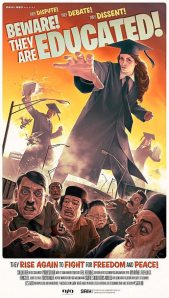
Daily Kos: Cuts to Higher Ed Funding: Were Eating Our Seed Corn.
Together with:
http://www.latimes.com/news/opinion/editorials/la-ed-stafford-20120428,0,1118808.story
Education is one of those things that tends to get shoved under the carpet in politics. A conservative president (George W. Bush) increased funding to schools immensely. The only catch: public schools now focus a large portion of their energy on high-stakes standardized tests. At every turn, we see "limited government" radicals joining "social justice" radicals to make such tests the most important thing to a school. So much so that children are no longer so much human as numeric. For an utterly disturbing article on this phenomenon, click here. The video is here.
The goal is to make students "college and career ready." I've already covered the idea of career training in a previous blog. As far as college readiness, I'm dealing with a state that is not requiring handwriting, keyboarding (typing), public speaking, or even health. Here are four things that our district doesn't require. Why? The state doesn't require them. Everything is at a minimum...running on the least common denominator.
In general, I think it comes to this: education should make kids smart. These days a really good education is designed to make kids rich. That distinction plays out over time, I think. Your first job is one thing...your last job is the most important one. One colleague of mine is giving a commencement speech this month. One of this person's "first" jobs was managing a used bookstore. According to present policy, the college education was a failure. According to reality, such an education was wildly successful.
Today, Americans owe more in student loans than they do in car loans. Want to increase automobile sales? Perhaps lessening the student loan burden would help. But that could lead to higher taxes, and that is unthinkable in this day and age. Well...
Educated people tend to pay more taxes. Want to lower the tax rate in 10 years? Fund education, legitimately. Teach students what they need to know to be successful--you can't write programming code very well from the world of single-finger typing or dual-thumb texting work. Forget interest, altogether. Give all students the chance to choose their schools based on fit and merit, not money. Antioch is taking a chance by completely waiving tuition. Their tuition-free plan could make them a leading institution in the nation. Quickly. And think of how much those students will cling to Antioch as alumni.
It's a brave move, but we see how timid Congress is in an election year. Lack of action leads to disruptive change--disruptive, negative change.
LACs, public schools, and many other social systems in America need to embrace such disruptive change...and control it. Otherwise, they will become victims of outside forces with little or no interest in long-term success...or even viability.

